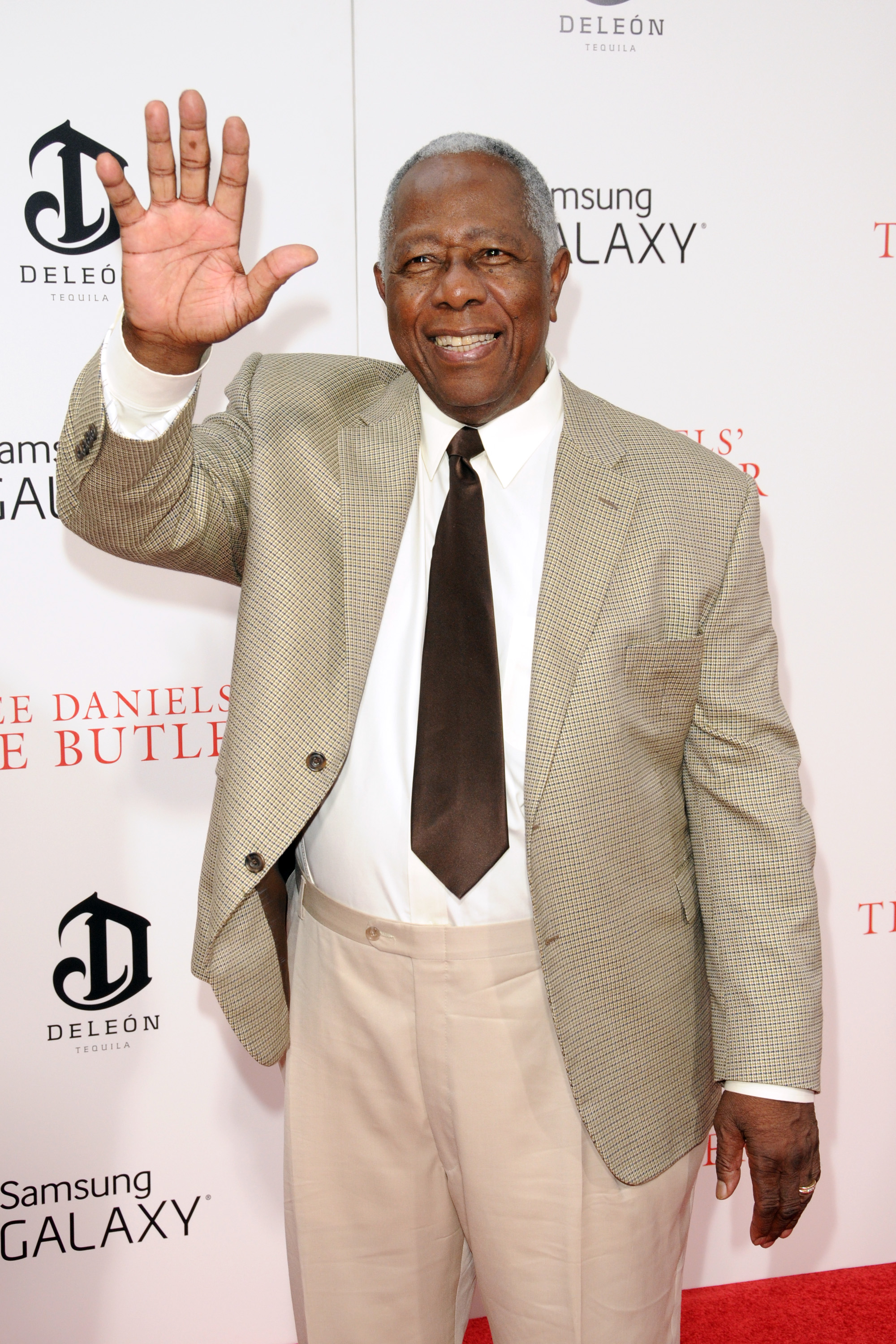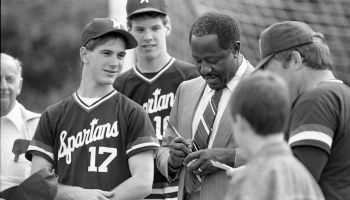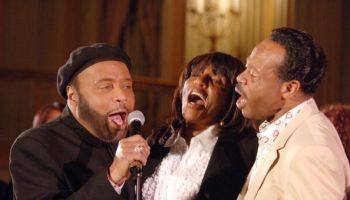
Source: Ivan Nikolov/WENN.com / WENN
(Black PR Wire) Hank Aaron, who endured racist death threats while chasing down and breaking Babe Ruth’s all-time home run record, and still considered by many to be baseball’s legitimate long ball king, died Friday. He was 86.
“Hammerin’ Hank” eclipsed Ruth’s longstanding mark with his 715th career home run on April 8, 1974, and he finished his 23-year major league career – mostly spent with the Milwaukee and Atlanta Braves — with 755 total. His record stood until Barry Bonds broke it in 2007 and established the new mark of 762, although suspicions that Bonds used performance-enhancing drugs prompted some in the baseball community to advocate for an asterisk to be placed on his new mark and has kept him out of the Hall of Fame.
Aaron, a native of Mobile, Alabama and a staunch advocate for civil rights until his death, was elected to Cooperstown on the first ballot in 1982 with 97.8 percent of the vote, at the time the second-highest percentage (behind only Ty Cobb) in history. He became the 10th enshrined Hall of Famer to die since the start of 2020, joining Tom Seaver, Whitey Ford, Bob Gibson, Lou Brock, Al Kaline, Joe Morgan and Phil Niekro last year, and Tommy Lasorda and Don Sutton already in 2021.
“When I watched Henry Aaron play baseball, I knew I was watching someone special,” President Biden said in a statement. “It wasn’t just about watching a gifted athlete master his craft on the way to a Hall of Fame career as one of the greatest to ever play the game. It was that each time Henry Aaron rounded the bases, he wasn’t just chasing a record, he was helping us chase a better version of ourselves.”
Former baseball commissioner Bud Selig was a longtime friend, and said in a news release from Major League Baseball: “Aaron was beloved by his teammates and by his fans. He was a true Hall of Famer in every way. He will be missed throughout the game, and his contributions to the game and his standing in the game will never be forgotten.”
Henry Louis Aaron, born in 1934, grew up poor in Mobile before starting his baseball career by signing his first pro contract with the Indianapolis Clowns of the Negro Leagues at the age of 17. In 1952 he joined the Braves, turning down an offer from the New York Giants to team in the outfield with Willie Mays, whom Aaron would be compared to throughout his career.
The 6-foot, 180-pound Aaron did not look like he’d become one of the most prolific sluggers in baseball history, and he never hit more than 47 homers (1971) in any one season. Yet his famed wrist-based swing and consistent excellence and durability resulted in 20 consecutive seasons of at least 20 home runs, including hitting 44 with 132 RBI and a .322 batting average during his lone National League MVP campaign in 1957.
Aaron also helped the Braves to a seven-game victory that year over the Yankees in the World Series, a loss the Bombers would avenge in 1958. He batted .364 with three homers during those two Fall Classics, and .357 with three homers against the Mets in the 1969 NLCS, the only postseason appearances of his career.
Forty five years after his final season back in Milwaukee with the Brewers in 1976, Aaron remains baseball’s all-time leader in RBI (2,297) and extra-base hits (1,477), and he scored at least 100 runs in a record 13 consecutive seasons from 1955-67. He also ranks third all-time in hits with 3,771. Incredibly, if you deleted all 755 of his home runs, he still would have exceeded 3,000 hits.
Aaron’s 25 All-Star Game appearances (from 1959-62 there were multiple games played) also are a major-league record. He participated in at least one All-Star Game in 21 consecutive seasons from 1955-75.
Of course, Aaron’s most famous home run and on-field moment remains his record-breaking blast to left field against the Dodgers’ Al Downing in 1974 at Atlanta’s Fulton County Stadium.
“What a marvelous moment for baseball, what a marvelous moment for Atlanta and the state of Georgia, what a marvelous moment for the country and the world,” Vin Scully said on the air that night. “A black man is getting a standing ovation in the Deep South for breaking the record of an all-time baseball idol. And it is a great moment for all of us.”
Aaron later revealed in his 1991 memoir “I Had a Hammer” that he had received hundreds of prejudiced and threatening letters – many referring to him as a [N-word] – from fans before accomplishing the feat.
“I never wanted them to forget Babe Ruth,” Aaron once said. “I just wanted them to remember Henry Aaron.”
Reactions from around baseball were quick to arrive upon the news of Aaron’s death.
“I can’t imagine what Hank Aaron went through in his lifetime,” fellow Braves legend Chipper Jones tweeted Friday. “He had every right to be angry or militant…..but never was! He spread his grace on everything and everyone he came in contact with. Epitome of class and integrity. RIP Henry Aaron!”
To wit, Aaron graciously recorded and sent a congratulatory scoreboard message to Bonds when the San Francisco slugger belted his 756th home run on Aug. 7, 2004.
“I was lucky enough to spend time with Hank on several occasions during my career and have always had the deepest respect and admiration for all that he did both on and off the field,” Bonds tweeted Friday. “He is an icon, a legend and a true hero to so many, who will forever be missed.
“Hank Aaron, thank you for everything you ever taught us, for being a trailblazer through adversity, and setting an example for all of us African-American ballplayers who came after you…Hank’s passing will be felt by all of us who love the game and his impact will forever be cemented in my heart.”
In 1999, Major League Baseball honored Aaron by renaming the award given to the best hitter in each league after the slugger. He received the Presidential Medal of Freedom from President George W. Bush in 2002.
“Laura and I are saddened by the passing of Hank Aaron,” President Bush said Friday in a statement. “The former Home Run King wasn’t handed his throne. He grew up poor and faced racism as he worked to become one of the greatest baseball players of all time. Hank never let the hatred he faced consume him.
“Henry Louis Aaron was a joyful man, a loving husband to Billye, and a proud father of six children who will deeply miss him.”
Aaron’s last public appearance came less than two weeks ago when he received the COVID-19 vaccine, saying “I feel quite proud of myself for doing something like this. … It’s just a small thing that can help zillions of people in this country.”
The Braves said Aaron died “peacefully in his sleep,” but no cause of death was given.














